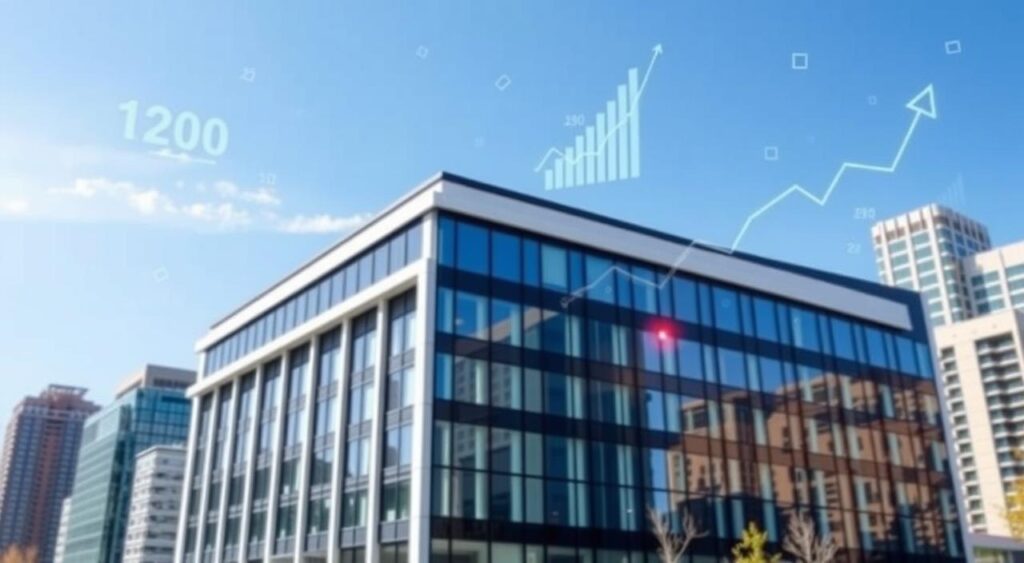Thinking about refinancing your commercial property but not sure where to begin? You might want to lower interest rates, boost cash flow, or access equity. Knowing the current refinancing scene is key for your business’s success. This guide offers expert advice and strategies for refinancing your commercial property well.
Refinancing a commercial loan can be a smart financial move. But, it’s vital to have a solid plan. We’ll cover the benefits of refinancing, the different options, and the steps for a successful refinancing.
Key Takeaways
- Explore the potential benefits of refinancing your commercial property, including lower interest rates and improved cash flow.
- Understand the different types of commercial property refinancing options, such as fixed-rate, adjustable-rate, and cash-out refinancing.
- Assess your creditworthiness and financial health to determine your eligibility for favorable refinancing terms.
- Prepare for the refinancing process by gathering the necessary documentation and understanding the property appraisal and inspection requirements.
- Learn how to choose the right lender and negotiate the best terms for your commercial property refinance.
Benefits of Refinancing Commercial Property Loans
Refinancing a commercial property loan can bring many benefits to business owners. One big advantage is getting a lower interest rate. This can greatly lower the total interest paid over time, saving a lot of money. With lower interest rates, businesses can also reduce monthly payments, which means more money for other important business needs.
Another great benefit is improved cash flow. Lower monthly payments from a new loan can give businesses more money to grow. This extra cash can help fund new projects, hire more staff, or meet other business needs.
| Benefit | Impact |
|---|---|
| Lower Interest Rates | Decreased total interest paid, significant cost savings |
| Reduced Monthly Payments | Freeing up cash flow for business needs and investments |
| Improved Cash Flow | Greater liquidity to support growth and development |
By using commercial property refinancing, business owners can improve their financial situation. They can lower their monthly payments and find new ways to grow. Whether they want to lower interest rates, reduce monthly payments, or access equity in their property, refinancing can help.
When to Consider Refinancing Commercial Property
Refinancing a commercial property loan can be smart in many situations. One reason is when interest rates drop, letting you get a lower rate and save money. Another reason is if your business’s credit score goes up, which might get you better loan terms.
Changes in the real estate market can also offer chances to use your property’s increased value. For instance, if your property’s value has gone up, you might get better loan terms by refinancing and using the extra equity.
Some owners refinance to combine multiple loans, making their finances simpler. This can also help cut down on fees related to managing their properties.
Reasons to Refinance Commercial Property
- Lower interest rates compared to the initial loan
- Improved credit profile and business financials
- Increased property value and equity
- Consolidation of multiple loans for simplified management
By looking at your specific situation and the current market, you can decide if refinancing is right. It can help improve your cash flow, lower borrowing costs, and set your business up for success in the long run.
| Lender Type | Advantages | Disadvantages |
|---|---|---|
| Traditional Banks | – Shorter loan tenures – Rigorous regulatory process | – More stringent approval criteria |
| CMBS or Hard Money Lenders | – Easier access to funds | – Less favorable interest rates and terms |
| Government-Backed Institutions (SBA loans) | – Lower interest rates – Extended loan tenures | – Primarily beneficial for small business owners |

“Many investors have saved hundreds each month by refinancing their commercial properties to reduce their interest rates.”
Types of Commercial Property Refinancing Options
When you think about refinancing your commercial property, it’s key to know the different options. These choices can help you get the most out of your real estate investments.
Fixed-Rate Refinancing
Fixed-rate commercial refinance means you get a new loan with a fixed interest rate for the whole term. This makes your payments steady and protects you from rate hikes. It lets you secure a good interest rate for the loan’s life.
Adjustable-Rate Refinancing
Adjustable-rate commercial refinance has a loan with rates that can change over time. It often starts with lower rates. This option is good if you think rates will drop, but it also means payments could go up if rates rise.
Cash-Out Refinancing
Cash-out commercial refinance lets you use your property’s equity for business needs. This can be great for expanding your business, improving your property, or paying off debts. It’s a smart way to use your property’s value.
Every refinancing option has its own benefits and things to think about. It’s crucial to look at your financial goals, the market, and your property’s details. This will help you pick the best refinancing plan for you.

“Refinancing your commercial property can unlock significant financial opportunities, whether you’re looking to lower interest rates, improve cash flow, or access equity for business growth.”
Current Market Trends and Rates for Commercial Refinancing
The commercial real estate market is always changing. Business owners and investors watch these changes closely. In 2024, the commercial refinance market will have both good and bad sides.
The loan refinance rates have gone up a bit. The 10-year Treasury rate is now around 3.745% as of September 2024. This increase is because of the Federal Reserve’s fight against inflation. Despite higher rates, the commercial refinance market trends are still good. Lenders are competing and offering many refinancing choices.
One big trend is the use of commercial refinance predictions 2024. As the economy gets better, businesses will look for refinancing. They want better terms. Lenders might ask for stronger financials and more documents.
| Loan Type | Interest Rate Range | Max LTV | Amortization |
|---|---|---|---|
| Conventional | 5.87% – 10.00% | 75% – 85% | Up to 30 Years |
| Private Banking | 5.87% – 10.00% | 75% – 85% | Up to 30 Years |
| SBA 7A | 5.50% – 10.50% | 85% | Up to 25 Years |
| SBA 504 | 6.04% – 6.51% | 90% | Up to 25 Years |
| CMBS | 5.88% – 7.49% | 75% | Up to 30 Years |
Businesses looking to refinance commercial property should look at all options. They should work with experts to find the best deal for their needs.

Assessing Creditworthiness and Financial Health
Before you start refinancing your commercial property, it’s key to check your business’s credit and finances. Lenders will look at your credit history, score, cash flow, profits, and debt-to-income ratio. They use this info to decide if you qualify and what terms they can offer.
It’s important to make sure your finances meet the refinancing needs. Knowing your commercial property refinance credit requirements and commercial refinance financial qualifications helps. This way, you can get better terms and make refinancing work for your business.
Here’s what you should look at:
- Check your credit score and history
- Look at your cash flow and profits
- Check your debt-to-income ratio
- See if you have collateral or assets
Fixing any financial issues can help you get a good refinancing deal. Talking to financial experts can also help a lot.
“Refinancing a commercial property is not just about lowering interest rates – it’s about aligning your financial goals with the right refinancing options to drive long-term business growth.”
Knowing your commercial property refinance credit requirements and commercial refinance financial qualifications helps you feel confident. It also helps you get the best terms for your business.

| Refinancing Option | Key Advantages |
|---|---|
| Permanent Loans | Predictable fixed interest rates and long-term financing |
| SBA 7(a) Loans | Lower down payments and favorable terms for small businesses |
| SBA 504 Loans | Long-term, fixed-rate financing at below-market rates |
| Bridge Loans | Quick access to capital for time-sensitive opportunities |
| Construction Loans | Funds released in stages as construction milestones are achieved |
Preparing for the Refinancing Process
Starting the commercial mortgage refinancing journey needs careful planning. You must collect all the commercial refinance documentation first. This includes financial statements, tax returns, and property appraisals. Lenders will check these to see if you’re a good borrower and if your property is worth enough.
Documentation Requirements
To make refinancing easier, property owners should have these documents ready:
- Detailed financial statements, including balance sheets, income statements, and cash flow projections for the past three to five years
- Tax returns for the same period
- Proof of income, such as rent rolls or lease agreements
- Information about any existing loans or mortgages on the property
Commercial Property Appraisal and Inspection
Lenders also need a detailed commercial property appraisal for refinance and a thorough commercial property inspection for refinance. These help figure out the property’s value and condition. The property’s worth is key in setting up the loan.
Getting all your documents in order and preparing for the appraisal and inspection can help. It makes the refinancing process smoother and can lead to better loan terms.

Choosing the Right Lender for Refinance Commercial Property
Choosing the right lender for refinancing your commercial property is key. The lender you pick can affect your interest rates, loan terms, and how smooth the refinancing process is. Look for a lender with experience in commercial real estate, a good reputation, and flexibility to meet your business needs.
Experience is important. Commercial property refinance lenders with a lot of experience can guide you well. They know the challenges of commercial real estate and can offer solutions that fit your needs.
Also, check the lender’s reputation. Look for reviews and testimonials from past clients. A lender known for great customer service and problem-solving can improve your experience.
Flexibility is crucial when choosing a commercial refinance lender. Find a lender who listens to your goals and financial needs. They should then tailor the refinancing options to help you the most.
By carefully looking at these factors and doing your research, you can find the best commercial property refinance lenders. The right lender can greatly help you get the most out of refinancing your commercial property.
“Choosing the right lender is essential for a smooth and successful commercial property refinancing process. Look for a partner with expertise, a strong reputation, and the flexibility to meet your unique needs.”
Tips for a Successful Commercial Property Refinancing
Refinancing a commercial property can be tricky. But with the right steps, you can get good terms and avoid problems. Here are some tips to help you refinance smoothly and successfully:
Start Early
Start the refinancing process early, before your current mortgage ends. This gives you time to look over options, talk to lenders, and close the deal. It’s especially important if your loan is up for renewal in the next 18 months, as rates are likely to go up.
Negotiate Terms
Don’t be shy about negotiating with your lender. They might be willing to change terms to keep your business. Talk about interest rates, loan amounts, and how long you’ll pay it back. Also, reaching out to different lenders can help you get more money and lower rates.
Beware of Pitfalls
Make sure you understand all the terms and conditions to avoid surprises. Look out for things like prepayment penalties or hidden fees. Knowing about possible issues, like tax liens or poor business performance, can help you deal with them early on.
By following these commercial refinance tips, sticking to commercial property refinance best practices, and avoiding commercial refinance mistakes, you can confidently refinance your property. This way, you’ll get the best deal for your commercial property.

Tax Implications of Commercial Property Refinancing
Refinancing a commercial property can have tax implications. Loan proceeds from a refinance are usually not taxable income. However, there are other tax factors to consider.
One important thing is the impact on the property’s basis with a cash-out refinance. Taking out a larger loan and getting cash doesn’t automatically increase the property’s taxable basis. This can affect your depreciation deductions and capital gains taxes when you sell the property.
Also, the mortgage interest for loan proceeds not used for rental purposes may not be deductible. It’s vital to talk to a tax professional or accountant. They can help understand the tax implications of your refinancing and ensure you follow all rules.
| Benefit | Consideration |
|---|---|
| Cash-out refinance can provide immediate access to funds | Cash proceeds are not considered taxable income |
| Ability to consolidate debt, fund improvements, or make other investments | Increased loan balance may not increase the property’s taxable basis |
| Avoid capital gains taxes associated with a property sale | Taxes are still owed upon eventual sale of the property |
Commercial property owners should think carefully about the tax considerations for commercial property refinance and the commercial refinance tax impacts. Working with tax professionals can help make informed decisions. This way, you can maximize benefits and minimize tax liabilities.
Refinance Commercial Property: Case Studies and Success Stories
Looking at real-life examples can give us valuable insights into the benefits of refinancing commercial property loans. Let’s explore two compelling case studies that show the power of this financial strategy.
A small business owner had a commercial property loan with a high-interest rate. As the business grew, the owner saw a chance to refinance and lower payments. This move helped the business get a lower interest rate, reduce debt, and free up capital for growth. It was a key factor in the company’s success.
Another case is about a client who rented an office and warehouse. By refinancing their property, they saved about $2,000 a month. This savings allowed them to invest in expanding their business, leading to more revenue and profit.
| Key Refinance Statistics | Insights |
|---|---|
| Commercial loans typically mature in 5-10 years, while home loans mature in 30 years. | Refinancing commercial properties requires a different approach than residential refinancing. |
| Commercial refinances depend on the net operating income (NOI) of the property. | Properties with unstable or low NOI may face challenges in securing refinancing loans. |
| Refinancing can lead to increased cash flow and return on investment for commercial real estate investments. | Successful refinancing can unlock significant financial benefits for commercial property owners. |
| Refinancing efforts can lead to rental increases of over 25% in commercial properties. | Refinancing can positively impact the performance and profitability of commercial properties. |
These case studies and statistics show the real benefits of refinancing commercial property. By lowering interest rates and reducing debt, businesses can get the capital they need for growth. This leads to long-term success.

“Refinancing our commercial property loan was a game-changer for our business. The reduced monthly payments and access to additional capital allowed us to expand our operations and reach new levels of success.”
– Alex and Tina, Small Business Owners
The Role of Commercial Property Refinancing in Business Growth
Commercial property refinancing is a key tool for business growth. It lets businesses use the equity in their properties and get lower interest rates. This way, they can invest in important projects that help them succeed in the long run.
One big advantage of refinancing is better cash flow. Lower interest rates mean lower monthly payments. This extra money can be used for growth, buying new properties, or updating facilities.
- A case study shows a $54 million hotel in Darwin, Australia, saw its NOI jump from $4.7 million to $6.3 million after refinancing. Its value rose to $70.5 million at a 9.00% Cap Rate.
- Without refinancing, the 5-year IRR would have been 17.9%; with it, it went up to 19.1%, a 1.2% boost.
- The real estate industry often uses 50-70% leverage. This shows how refinancing can greatly increase cash flow.
Refinancing also lets businesses tap into the equity in their properties. This cash-out refinancing option lets owners use equity for growth. They can enter new markets, buy more properties, or invest in new technologies.
“Mortgage refinancing is considered one of the easiest ways to raise funds, and property owners may opt for cash-out or build-out options to extract equity from their properties.”
By using commercial property refinancing, businesses can grow and stay competitive. They can expand, update facilities, or adopt new technologies. Refinancing gives them the financial flexibility they need to thrive.
Refinancing vs. Alternative Financing Options
Businesses have many ways to finance commercial property, not just traditional refinancing. It’s key to look at the good and bad of each option. This helps find the best choice for your business needs and goals.
One option is the commercial bridge loan. These loans are short-term, usually under two years. They can help get to more permanent financing. But, they often have higher interest rates than the market average.
Cash-out refinancing is another choice for businesses with a lot of equity. It lets owners use the built-up equity. Lenders usually need at least 30% equity left after the cash is taken out.
Exploring the Small Business Administration (SBA) loan program is also a good idea. SBA loans have good terms and rates. They’re a solid option for businesses looking to finance commercial property.
| Financing Option | Interest Rates | Loan Terms | Accessibility |
|---|---|---|---|
| Commercial Property Refinancing | Varies based on market conditions | Typically 5-25 years | Requires strong financial history and equity |
| Commercial Bridge Loans | 1-3 percentage points higher than market rate | 2 years or less | Faster approval process, more flexible criteria |
| Cash-Out Refinancing | Varies based on market conditions | Typically 5-25 years | Requires significant equity in the property |
| SBA Loans | Competitive market rates | Varies based on SBA program | Accessible to a wide range of businesses |
The choice between refinancing and other financing options depends on your business’s needs and goals. By looking at commercial property refinance vs other financing and comparing commercial refinance to alternative business loans, you can make a smart choice. This will help you get the right funding for your commercial property investment.
“The key is to carefully weigh the pros and cons of each financing option to determine the best fit for your business. Rushing into a decision without considering alternatives could leave you with a less than optimal solution.”
Working with Refinancing Professionals
Getting through commercial property refinancing is easier with the help of commercial property refinance professionals and experts for commercial refinance. This team might include mortgage brokers, commercial lenders, real estate attorneys, and financial advisors. Each one brings their own expertise to the table.
These experts for commercial refinance can guide you through evaluating your current loan, understanding market conditions, and negotiating better terms. They make sure you follow all the rules and help make the refinancing process smoother. This way, you can make smart choices and get the most out of refinancing your commercial property.
- Mortgage brokers help find the right loan and lender for you.
- Commercial lenders know all about financing commercial properties. They help you through the underwriting process.
- Real estate attorneys check legal documents, advise on rules, and protect your interests.
- Financial advisors do a deep dive into your finances. They help you see how refinancing affects your investment and cash flow.
Working with this team of commercial property refinance professionals makes the refinancing process smoother. You’ll make better decisions and take advantage of benefits like lower interest rates and more cash flow. You might even be able to use the equity for new investments.
| Key Considerations When Working with Refinancing Professionals | Recommended Criteria |
|---|---|
| Credit Score | Minimum 680 |
| Debt-to-Income Ratio (DTI) | Maximum 43% |
| Loan-to-Value Ratio (LTV) | Maximum 80% |
| Debt Service Coverage Ratio (DSCR) | Minimum 1.25 |
| Cash Reserves | Sufficient to cover unexpected expenses or financial hardships |
With a team of commercial property refinance professionals by your side, you can tackle commercial property refinancing with confidence. You’ll get good terms and make the most of your commercial real estate investments.
Common Mistakes to Avoid in Commercial Property Refinancing
Refinancing commercial property can be tricky. It’s important to know the common mistakes that can go wrong. One big mistake is not starting the process early enough. This leaves little time to compare lenders and understand the tax implications.
Another mistake is not considering the closing costs. These costs include application fees, origination charges, and appraisal costs. They can eat into the savings from a lower interest rate. Businesses should think about the long-term benefits to make sure refinancing is worth it.
It’s also important to watch out for lenders who promise too much. Always compare offers from different lenders to get the best deal. And, don’t forget to keep your credit score strong. A good credit score can help you get better terms.
By knowing and avoiding these commercial property refinancing mistakes to avoid, businesses can refinance with confidence. This can lead to big financial benefits.
“Refinancing can be a powerful tool for businesses, but it’s essential to approach it with a clear understanding of the potential pitfalls and a well-defined strategy to avoid them.”
To refinance successfully, start early and do your research. Look at the tax implications and think about the long-term benefits. By being proactive and informed, businesses can make the most of refinancing. This can help them grow and succeed.
Refinance Commercial Property: Expert Tips & Guide
Refinancing commercial property can seem complex, but with the right help, businesses can gain a lot. This guide offers expert tips and strategies for making smart decisions and refinancing your property successfully.
One big benefit of refinancing is getting lower interest rates. Experts say to refinance when rates are 2% higher than the market. Even small rate drops can save a lot each month, helping your business grow.
Timing is key in refinancing. Look at market trends, interest rates, and your goals to pick the best time. Property value, how full it is, and income also matter for good loan terms.
Look at different refinancing options like fixed-rate, adjustable-rate, and cash-out. Each has its own benefits. It’s important to compare them well and talk to experts to choose wisely.
Getting ready for refinancing is crucial. You’ll need financial statements, tax returns, and a business plan. These show lenders you’re creditworthy and your property is profitable. Working with trusted refinancing pros can make things easier and avoid problems.
With the help of this guide, businesses can confidently refinance. This can lead to better financial health and growth for the future.
“Refinancing commercial property can be a game-changer for businesses, unlocking access to lower interest rates, improved cash flow, and the ability to tap into built-up equity. With the right strategy and professional guidance, the refinancing process can be a smooth and rewarding experience.”
In summary, this guide has shown how to refinance commercial property. By understanding the benefits, knowing when to refinance, looking at options, and preparing well, you can improve your business’s finances. Use the advice here to move forward and secure a better future.
Conclusion
Commercial property refinancing is a great way for businesses to improve their real estate investments. It helps reduce costs and supports growth. By understanding the benefits and how to refinance, businesses can make smart choices.
This guide has given you the key tips and insights to navigate refinancing. Whether you want to lower interest rates or improve cash flow, you’re on the right track. It’s all about making the most of your commercial property.
To refinance successfully, stay up to date with market trends and rates. Check your business and property’s financial health. Work with experienced lenders and finance pros. Follow these steps and use the strategies from this guide to grow your business.
This guide emphasizes the need for thorough research and understanding your needs. Seek expert advice for a smooth refinancing process. By using the insights and best practices here, your business can thrive in the changing commercial real estate market.
FAQ
What are the primary reasons to refinance a commercial property loan?
You might refinance to get a lower interest rate. This can also help improve your cash flow by lowering monthly payments. Additionally, you can tap into the equity built up in your property.
When is the right time to consider refinancing a commercial property?
It’s a good idea when interest rates drop. Or if your business’s credit score has gone up. Also, if the real estate market has changed, making your property more valuable.
What are the different types of commercial property refinancing options?
There are a few main types. You can choose fixed-rate, adjustable-rate, or cash-out refinancing.
What are the current market trends and rates for commercial property refinancing?
Expect more demand and slightly higher interest rates in 2024. Lending standards might get stricter. But, competition could lead to better rates and terms for you.
How do I assess my business’s creditworthiness and financial health for commercial property refinancing?
Lenders will look at your credit history and score. They’ll also check your cash flow, profitability, and debt-to-income ratio. Keeping your finances strong is key.
What are the key steps in preparing for the commercial property refinancing process?
First, gather all needed documents like financial statements and tax returns. Then, get a property appraisal and inspection done.
How do I choose the right lender for my commercial property refinancing needs?
Look at interest rates, loan terms, and the lender’s experience and reputation. Compare different lenders, including banks, online lenders, and specialized institutions.
What are some tips for a successful commercial property refinancing experience?
Start early and negotiate terms with your lender. Be aware of potential pitfalls like prepayment penalties or hidden fees.
What are the tax implications of commercial property refinancing?
Loan proceeds are usually not taxable income. But, cash-out refinancing can affect your property’s basis. This might impact your depreciation deductions and capital gains taxes. Always consult a tax professional.
What are some common mistakes to avoid in commercial property refinancing?
Don’t wait too long to start the process. Research and compare lenders carefully. Also, be aware of tax implications and closing costs.

